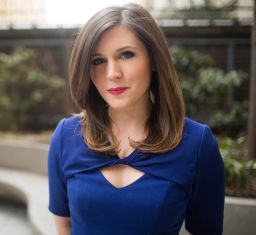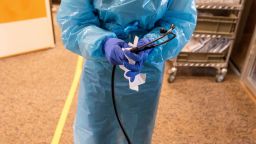Editor’s Note: Jill Filipovic is a journalist based in New York and author of the book, “OK Boomer, Let’s Talk: How My Generation Got Left Behind.” Follow her on Twitter. The opinions expressed in this commentary are solely her own. View more opinion articles on CNN.
This is the second year that Covid-19 has upended holiday travel, after nearly two long years of plans undone, loved ones unseen and life milestones unmarked. Now that vaccines are widely available in the United States, it’s especially frustrating that we are still held hostage to a pandemic fueled by the people who refuse to get vaccinated and by the policy choices of wealthy nations not to treat this pandemic like a global pandemic and vaccinate the world.

But here we are, and despite the fact that the United States has some of the highest Covid-19 case and death rates in the world, our Centers for Disease Control and Prevention is warning US citizens to avoid travel to over a dozen countries and has banned visitors from eight southern African countries. Not that Americans are all staying home: Some 2 million people traveled through US airports daily on December 16, 17 and 18 – more than double last year’s numbers, although still lower than pre-Covid-19 rates.
Full disclosure: I was one of them. Like millions of people the world over, I’m taking a hard look at my own risk (including the risk I pose to others) and making careful choices about how and when to grab back some aspects of pre-Covid-19 life. Travel is often necessary for my job; it’s also one of my greatest joys and a requirement to see many of my loved ones, family members and closest friends.
I’m vaccinated and boosted, and I’m in my 30s with no health problems, making me less susceptible to Covid-19 infection and making it extremely unlikely that I would get seriously ill from Covid-19 and contribute to an overtaxed health care system. I avoided all unmasked and unnecessary indoor activities in the week before my trip, and tested negative before I traveled. I masked in the airport and on the plane and have avoided indoor gatherings and unmasked indoor activities since my arrival.
I feel comfortable, in other words, getting back some of the joy, connection and novelty that has been sacrificed over the past two years. And others who have made responsible and pro-social choices – getting vaccinated and boosted, complying with indoor mask rules, testing regularly – should be able to do the same. White House Chief Medical Adviser Dr. Anthony Fauci agrees: “If I had to I would have no problem getting on an airplane,” he told CNBC. “I’m vaccinated. I’m boosted. I know we have to wear a mask on an airplane.”
The risk, he emphasized, is never zero, and there have been many breakthrough infections with the Omicron variant on the rise. Of course, every family needs to evaluate their individual circumstances and make their own risk assessment – plenty of vaccinated people aren’t comfortable traveling yet, and many have at-risk loved ones they’re worried about. And unfortunately, some unvaccinated people don’t hesitate to get on an airplane or share a meal inside, which ups the risk for everyone. “But for right now,” Fauci said, “people who are vaccinated and boosted should feel reasonably comfortable.”
Health is about avoiding disease, yes. But it’s also more holistic than that: If we want to be healthy people, we need other human beings; we need connection; we need touch; we need experiences that bring us pleasure, that challenge us and that expand our worldview.
And liberals have long been better than conservatives at stressing harm reduction over abstinence because we know that, from sex to substance use, “Just say no” doesn’t work. This conclusion holds true for public health more broadly: Telling people to forgo pleasurable activities isn’t usually as effective as reducing risk and giving people the tools to be safer.
With an airborne virus, though, those tools can’t simply be on offer for individuals to take or reject – we all have to breathe the same air, and so we need policies that protect all of us. That’s where our leadership has utterly failed.
It was still striking, in planning for a trip, to see how much of this is left up to individual choice and risk calculus. Many countries still do not require vaccination for tourists and other visitors to enter. The Biden administration has tried to institute various federal vaccine mandates for certain categories of workers, but they don’t apply to a great many Americans and have been routinely challenged in court.
With a few exceptions like airports and airplanes, there are still no national rules mandating masks in high-risk settings, and many Republican-run states have made it illegal for employers or institutions to require either vaccination or indoor mask-wearing.
Testing is also still a mess. Even though a scramble for pre-holiday tests was entirely predictable, testing centers saw hourslong lines, and pharmacies were sold out of at-home tests. And while the Biden administration has rightly announced a plan to send out half a billion free at-home Covid-19 tests, just two weeks ago a key official was questioning that very idea. The proposal is certainly better late than never, but when facing holiday travel and rapidly rising Covid-19 numbers, it does come quite late.
At this point, the pandemic is at least partly of our own making. The US government and many governments the world over have failed to implement the necessary measures – broad vaccine mandates, global vaccine sharing, etc. – to stop the spread. As a result, it doesn’t look like we’re going to be Covid-free for a very long time, if ever.
Get our free weekly newsletter
As that realization dawns on more and more people – and as a great many people never really cared about the risk of Covid-19 to begin with – we can’t be surprised when people go back to some of their pre-pandemic pleasures, whether that’s travel or gathering with loved ones or going to concerts or seeing a movie in the theater or dining out. As long as the US is one of the most Covid-stricken places in the world, our leaders can list dangerous “red countries” to avoid, but it won’t do much to decrease our own numbers.
We can’t rely on individual choices and gentle encouragement to end this pandemic. We need policies that bar the unvaccinated from places where they can infect others and are more at risk of infection themselves – which means most inessential indoor spaces, from restaurants to sporting arenas to airplanes. We need mask mandates for essential indoor activities. We need easy, free and readily available testing.
And then we need to enjoy getting our lives back.






